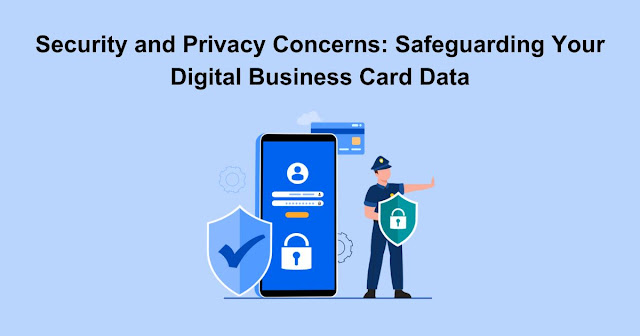Security and Privacy Concerns: Safeguarding Your Digital Business Card Data
In the age of rapid digital transformation, the way professionals connect, share information, and establish their brands has evolved significantly. One of the latest entrants in this domain is the digital business card, a modern alternative to traditional paper cards. While digital business cards offer an array of benefits, from eco-friendliness to ease of sharing, they also bring forth new challenges in terms of data security and privacy. Here, we will delve deep into the security and privacy concerns surrounding digital business cards and explore ways to safeguard your data effectively.
Understanding the Risks
a. Data Breaches: Like any digital tool, digital
business cards are susceptible to cyberattacks. A breach could expose personal
details like your name, contact information, website links, and even social
media profiles.
b. Unauthorized Sharing: Once you share your digital business
card, you can't always control its distribution. It could be forwarded
to others without your consent, potentially leading to unsolicited contacts or
spam.
c. Data Storage Concerns: The platforms that host
your digital business card might store your data in servers that are
susceptible to hacking. Understanding where and how your data is stored is
crucial.
Implementing Robust Security Measures
a. Choose Secure Platforms: Not all digital business
card platforms are created equal. Opt for those with a known reputation for
security, frequent software updates, and strong encryption protocols.
b. Regularly Update Your Details: Regularly updating
the information on your digital business card not only keeps it current but can
also be a strategy to deter long-term unauthorized use.
c. Multi-factor Authentication: Choose platforms that
offer multi-factor authentication (MFA) for account access. This ensures that
even if someone gains access to your password, they'll need another form of
verification to log in.
Safeguarding Your Privacy
a. Limit the Amount of Personal Information: While
it's tempting to add every detail to your digital business card, be discerning.
Only share essential information and be wary of including overly personal
details.
b. Be Selective in Sharing: Don’t share your digital
business card indiscriminately. Only share it with trusted contacts or in
networks where you're confident about the privacy norms.
c. Set Expiry Dates: Some digital business card
platforms allow you to set expiry dates for your card. This means that after a
certain period, the recipient can no longer access your card details, adding an
extra layer of privacy.
Staying Updated on Privacy Laws
Digital business card platforms, like other online entities,
are subject to privacy laws such as the General Data Protection Regulation
(GDPR) in Europe. Staying informed about these laws will help you understand
your rights and the obligations of platforms hosting your digital business
card.
Conclusion
The advent of the digital business card has undeniably reshaped professional networking, making it more efficient and dynamic. However, with these advancements come newfound challenges in the realms of security and privacy. By being proactive, understanding the risks, and implementing the strategies, you can make the most of your digital business card while ensuring your data remains safe and your privacy intact.




Comments
Post a Comment